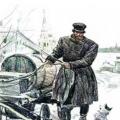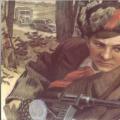Since 1976, he began working in the Perm ensemble “Rowan-Yagody”. Since 1977, Farika has worked as a violinist in the Perm restaurants “Gorny Krystal”, “Kama”, “Neva”, “Central”. In 1980 he left for Moscow and began working as a violinist at the Gloria night restaurant. There he began to sing. In 1984, Karamov left for Sochi, where he played and sang in one of the “cool” restaurants - “Saturn” - until 1989, he was recognized as the “Golden Violin of Sochi”. Returning to Moscow in 1990, he began playing in the group “Lots-man” (soloist A. Polotno).
In 1999, the first solo album “Chamber Songs” was released (producer A. Polotno, arranger K. Krasnov). It was then that the pseudonym was first used - Fedya KAMANOV (the author of the pseudonym was Anatoly Polotno).
Prepared by Mikhail Dyukov
Biography
Born March 13, 1955. Fedya's family lived in Perm; they lived in a trailer and in a barracks... Who in Russia can be surprised by this? And yet, despite the difficulties, the parents enrolled their son in a music school at the age of six. There he studied violin for 7 years.
Confirmation of his musical nature was his admission to the Perm College of Music in 1972 in the violin department. He would be drawn to the classics later, in adulthood, and young Fedya Karmanov began working in the Perm ensemble “Rowan-Yagody” in 1976. And the tavern whirlwind began! Since 1977, Fedya’s violin could be heard in such central Perm restaurants as “Rock Crystal”, “Kama”, “Neva”, “Central”.
The next turn of fate occurred in 1980, when Fedya left for Moscow and began working as a violinist in the famous night restaurant Gloria. There he began to sing. At that time, “Italianism” was at the peak of popularity and the young, handsome brunette was right at home. Of course, a tavern is a tavern, and in Karmanov’s repertoire there were songs of a different style - thieves.
In 1984, Fedya Karmanov left for Sochi, where he played and sang in one of the “cool” restaurants – “Saturn” – until 1989. The most memorable event of those years was his recognition as the “Golden Violin of Sochi”. (And you thought! No more, and no less!... Know, ours, Perm!)
Returning to Moscow in 1990, he began playing in the group “LotsMan”, which at that time was already working in the capital. His activity in the group of the then already popular fellow countryman Anatoly Polotno was not limited only to violin parts - almost all the songs featured his backing vocals, and there was also a solo performance of Anatoly Polotno’s song “Islands” in the 1991 album “In the Kitchen”. True, work at “LotsMan” was interrupted twice for six months (1992-93) - Fedya Karmanov worked in Japan under a contract. And since 1993, he has been Anatoly Polotno’s permanent partner, violinist and vocalist.
Fedya Karmanov's violin and vocals have been heard in all of Anatoly Polotno's albums since 1989. Anatoly considers Fedya a Vocalist with a capital V. Their true male friendship led to the fact that Anatoly Polotno began writing songs specifically for Fedya Karmanov. In 1999, the album “Tramp” was released (produced by Anatoly Polotno, arranger Konstantin Krasnov), where he sang more than a dozen popular criminal songs, including “Chiki-briki” by Anatoly Polotno (album “For Girls”, 1989) , “For taverns - tavern smoke” by Sergei Nagovitsyn (album “City Meetings”).
In 2001, STM-Pecords (Kyiv) published Fedya Karmanov’s album “Time is Money!” (the author of all songs is Anatoly Polotno), which the authors dedicated to their talented fellow countryman, friend, the untimely deceased Sergei Nagovitsyn. The album was recorded in Perm at the 9M studio (producer Anatoly Polotno, arranger Eduard Andrianov, sound engineer Mansur Askakov).
Fedya Karmanov is one of the best violinists in Moscow and Russia. He continues his concert activities together with Anatoly Polono, working by invitation in the best restaurant spots in Moscow. Favorite recreation is rafting on northern rivers and fishing. Over the past few years, he and Anatoly have walked through the Polar Urals, Pechora, Laptopai (Yamal Peninsula). But he doesn’t like to hunt - except maybe shoot at beer cans... Other sports passions include tennis (mastered in Japan), boxing (Anatoly Polotno: “More than once I had to defend myself back to back!”). Married, adores his wife Lena and daughter Marcella.
The range of musical styles in Canvas songs is unusually wide: thieves chords and tango, bossa nova and romance, ... Read all
Since 1988, Anatoly Polotno’s guitar and his voice have been heard not only in Perm, but throughout Russia. His songs have been released on countless cassettes and CDs. The genre of his work cannot be defined in one term - be it Russian chanson or urban romance. He has outgrown these boundaries.
The range of musical styles in Canvas' songs is unusually wide: thug chords and tango, bossa nova and romance, rock harmonies and gypsy tunes. But it is much more difficult to accurately define the style of his position. The rough truth of life and subtle lyricism, recklessness and philosophical depth are intertwined, and the understatement is sometimes understandable, and the picture drawn with a few strokes-words acquires volume and color. Impressionism? May be. More details about this can be found in the article Poetry of Anatoly Polotno and the role of the listener by Doctor of Physical and Mathematical Sciences and poet Stefan Mashkevich (New York), written by him specifically for our site.
A street guy, a daring sailor, a man tired of life are the heroes of his songs. Their features are the features of Anatoly himself. Poet, composer, artist.
I was born on February 18, 1954 in the city of Perm. Average height. High education. Origin – proletarian. Views are liberal-humane. I had a craving for creativity since childhood - I played drinking songs along with adults, to the accompaniment of the button accordion, which my dad played. He started singing on his own at the age of 13-14 at dances in the suburbs of Perm, on Maiskoye.
The first solo album, “Oh, Leli-Leli,” was released in 1988. The second album “Street Boy” - in 1989. Album No. 3 “For Girls...” - in 1989. Album No. 4 “Pop-non-stop” - in 1989. In 1990 - album No. 5 “Greetings from Lenka Panteleev.” In 1991 - album No. 6 “In the Kitchen”. In 1992, album No. 7 “Baba Lyuba” was released. The year 1994 was marked by the release of the album “Shara No. 8”. In nineteen ninety-five, the first “Golden Carriage”, the ninth album, rolled off the assembly line. 1999 – tenth album “We’ll Survive”. The beginning of the 21st century was marked by the album “Against the Wind” (2001) - re-released in 2008. In 2003, “Lucky Shpan” appeared. After her, in 2005, the Steamboat set off on its first voyage. The first “fishing” album “In the North” was released in the same 2005. The album of “increased culture” “Eh, Rossiyushka...” was born in 2007 (like my son Kirill) and was, of course, dedicated to my wife Natasha. The year 2007 was also marked by the release of our first duet collection with Fedya Karmanov, “Kiss me, good luck!”
In 2009, for the 70th anniversary of Arkady Severny, he recorded the album Hello, my respect, in which he sang Arkasha’s famous songs - “Hello, my respect” (mp3, text), “Skokar” (mp3, text), “Marseille” ( mp3, text), “Narva” (mp3, text) and many others. 2010, March – album “Rubles”.
I have been producing Fedya Karmanov, a friend and fellow countryman, since 1997. I wrote the albums “Money”, “The Car is Rocking” and “Gop-Stop, Salo!” for him. Two more Fedya solo albums were also released - “Tramp” (no relation to Raj Kapoor) and “Golden Violin of Chanson”. In addition to mine, they included songs by other authors (often “folk” or unknown).
Hobbies: painting. I play preference, backgammon, deberts (all with Fedya) and the guitar.
Hunter, fisherman, traveler.
Anatoly Canvas Biography The “Pilot” group gathered in 1988 in the city of Perm on the banks of the Kama River. They “crushed” the scale, “played” the first magnetic album “Oh, cherished, cherished...” and it began! The composition of the group "Lotsman" of the 1990 model: Anatoly POLOTNO (guitar, vocals) Sergei KAMA (keyboards, vocals) Fedya KAMANOV (violin, vocals) Marat KARAMOV (saxophone) Sanya "VAREZHKIN" RUKAVITSYN (bass guitar, double bass) Lenya "PINYA" » PINYEVSKY (vocals) *** Since 1988, Anatoly Clothno’s guitar and his voice have been heard not only in Perm, but throughout Russia. His songs have been released on countless cassettes and CDs. The genre of his work cannot be defined in one term - be it Russian chanson or urban romance. He has outgrown these boundaries. The range of musical styles in Canvas' songs is unusually wide: thug chords and tango, bossa nova and romance, rock harmonies and gypsy tunes. But it is much more difficult to accurately define the style of his position. The rough truth of life and subtle lyricism, recklessness and philosophical depth are intertwined, and the understatement is sometimes understandable, and the picture drawn with a few strokes-words acquires volume and color. Impressionism? May be. A street guy, a daring sailor, a man tired of life are the heroes of his songs. Their features are the features of Anatoly himself. Poet, composer, artist. Anatoly Canvas. Autobiography. I was born on February 18, 1954 in the city of Perm. Average height. High education. Origin – proletarian. Views are liberal-humane. I had a craving for creativity since childhood - I played drinking songs along with adults, to the accompaniment of the button accordion, which my dad played. He started singing on his own at the age of 13-14 at dances in the suburbs of Perm, on Maiskoye. The first solo album, “Oh, Leli-Leli,” was released in 1988. The second album "Street Boy" - in 1989. Album No. 3 "For Girls..." - in 1989. Album No. 4 "Pop-non-stop" - in 1989. In 1990 - album No. 5 "Greetings from Lenka Panteleev." In 1991 – album No. 6 “In the Kitchen”. In 1992, album No. 7 "Baba Lyuba" was released. The year 1994 was marked by the release of the album "Shara No. 8". In nineteen ninety-five, the first “Golden Carriage”, the ninth album, came off the assembly line. 1999 – tenth album “We’ll Survive”. The beginning of the 21st century was marked by the album “Against the Wind” (2001) - re-released in 2008. In 2003, “Lucky punks” appeared. After her, in 2005, the Steamboat set off on its first voyage. The first “fishing” album “In the North” was released in the same 2005. The album of “increased culture” “Eh, Russian. .." was born in 2007 (like my son Kirill) and was, of course, dedicated to my wife Natasha. 2007 was also marked by the release of our first duet collection with Fedya Karmanov, “Kiss me, good luck!” Fedya Karmanov, a friend and fellow countryman - I have been producing since 1997. I wrote for him the albums “Money”, “The Car is Rocking” and “Gop-Stop, Salo!” Also two more Fedya solo albums were released - “Tramp” (no relation to Raj Kapoor) and “ Golden violin of chanson." In addition to mine, they included songs by other authors (often “folk” or unknown). Hobbies: painting. I play preference, backgammon, deberts (all with Fedya) and the guitar. Hunter, fisherman, traveler. I wish you and your family good luck and prosperity! Sincerely, A.Polotno.
Since 1988, Anatoly Polotno’s guitar and his voice have been heard not only in Perm, but throughout Russia. His songs have been released on countless cassettes and CDs. The genre of his work cannot be defined in one term - be it Russian chanson or urban romance. He has outgrown these boundaries.
The range of musical styles in Canvas' songs is unusually wide: thug chords and tango, bossa nova and romance, rock harmonies and gypsy tunes. But it is much more difficult to accurately define the style of his position. The rough truth of life and subtle lyricism, recklessness and philosophical depth are intertwined, and the understatement is sometimes understandable, and the picture drawn with a few strokes-words acquires volume and color. Impressionism? May be. More details about this can be found in the article Poetry of Anatoly Canvas and the role of the listener by Doctor of Philosophy S. Mashkevich (New York), written by him specifically for the Fregat website.
A street guy, a daring sailor, a man tired of life are the heroes of his songs. Their features are the features of Anatoly himself. Poet, composer, artist.
I was born on February 18, 1954 in the city of Perm. Average height. High education. Origin – proletarian. Views are liberal-humane. I had a craving for creativity since childhood - I played drinking songs along with adults, to the accompaniment of the button accordion, which my dad played. He started singing on his own at the age of 13-14 at dances in the suburbs of Perm, on Maiskoye.
The first solo album, “Oh, Leli-Leli,” was released in 1988. The second album “Street Boy” - in 1989. Album No. 3 “For Girls...” - in 1989. Album No. 4 “Pop-non-stop” - in 1989. In 1990 - album No. 5 “Greetings from Lenka Panteleev.” In 1991 - album No. 6 “In the Kitchen”. In 1992, album No. 7 “Baba Lyuba” was released. The year 1994 was marked by the release of the album “Shara No. 8”. In nineteen ninety-five, the “Golden Carriage”, the ninth album, rolled off the production line. 1999 – tenth album “We’ll Survive”. In December 2001, the 11th album, “Against the Wind,” was released. Since 2001, the following albums have been reissued on CD: “We’ll Survive”: “Greetings from Lenka Panteleev”, “Baba Lyuba”, “In the Kitchen”. Preparing for the re-release of “Ball No. 8”.
A famous singer who glorifies such a direction in music as chanson, Anatoly Cloth was born on February 18, 1954 in the city of Perm. His character is characterized by a certain severity, fortitude, but at the same time sincerity and justice. The future artist inherited his love of music from his father, who loved to play the accordion. The boy was born and raised in a simple family, like all children, he loved to play pranks and have fun. However, at the age of two, the child’s family broke up: the artist’s parents divorced and he was left in the care of his grandmother. It was then that he learned all the mores of the street. Anatoly Cloth's wife died, leaving him with a daughter.
Despite the fact that Anatoly showed a craving for music since childhood, he was not forced to attend music school. The guy graduated from vocational school, then served in the army. While still a student at the school, he organized his own ensemble. In their native region, the guys achieved great success, and Anatoly’s talent was especially noted. He was advised to enter the cultural institute, despite the fact that the guy had problems with discipline and behavior.
During his student years, Anatoly worked part-time in taverns, performing the corresponding repertoire. Life wasn't going great, but he didn't complain about anything and was even happy. However, in 1986, a terrible tragedy happened in his life: his first wife died, leaving behind a little daughter, Lisa. The parents of the deceased wife helped raise the child. Out of grief, Canvas began to abuse alcohol, but in time he managed to calm down and pull himself together. Together with several comrades, he organized his own ensemble. The guys quickly found their own style and achieved significant popularity.
Some time after the loss of his wife, Anatoly again found love in his life. On the shores of the Black Sea he met the charming beauty Natalya. After some period they met again in Moscow. A girl at his concert came on stage with a bouquet of flowers and handed them to the artist. Such a meeting not only brought changes to Anatoly’s personal life, but also changed the direction of creativity, which became more lyrical.

It was Natalya who became the second wife of Anatoly Cloth and gave him a second daughter. In connection with her birth, the artist left work for some time and began improving the family nest. Only three years later he returned to creativity, but the artist began to be attacked by officials. They tried to accuse him of receiving unearned income and failure to pay child support to his first child. However, the singer himself associates this attitude with a lack of understanding of the new direction of creativity and banal human envy.
Interestingly, it was the law enforcement agencies from his native Perm who sent the singer to prison. He was not the only artist who suffered a similar fate. With all this, the cases were often fabricated. However, the case about Anatolia reached the capital’s television program “Man and the Law.” Due to the uproar, the artist was released, but given a warning.

Now Anatoly Canvas has forgotten all the hardships of life that happened in his life and delights his fans with new creative ideas. In addition, he is a happy family man who loves his wife and daughter.




